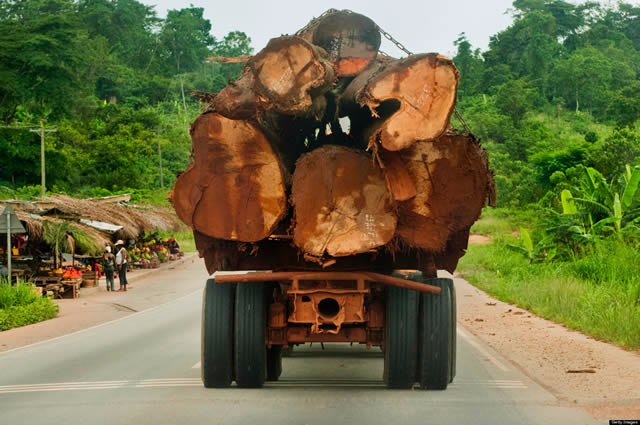
The Nature and Development Foundation (NDF) in association with Tropenbos International Ghana, a non-governmental organisation, has discovered that 2.5 million m³ of timber, which is equivalent to a forest area of 8,300 football fields, is illegally harvested annually in Ghana.
According to the NGO, the rate at which trees are cut in Ghana is three times more than the growing rate.
Speaking at the press conference held in Erata hotel in Accra, the Capacity Building Expert, Abena Woode, said illegal logging of timber is a major cause of Ghana’s deforestation.
“Between 2000 and 2010, increase in forest cover through forest plantations is 150,000 hectares, which accounts for only 13% of forest cover loss (1,150,000 hectares),” she stated.
The study which was titled “Issues Preventing the Supply of Legal Wood in the Domestic Market” was undertaken mainly to provide adequate information to support government’s proactive step on the proposed Public Procurement Policy (PPP) on timber and wood products.
She said, “Right now we are Tropenbos Ghana is an NGO implementing a European Union (EU) project of “strengthening the capacities of non-state actors to improve Forest Law Enforcement, Governance and Trade, Voluntary Partnership Agreement (FLEGT-VPA) and Reducing Emission from Deforestation and forest Degradation (REDD+) in West Africa.
The expert indicated that the 2012 forest and wildlife policy intended to ban illegal timber on the domestic market has not been achieved.
Ms Woode also said, there is a high demand for wood by consumers but low supply deficit leading to high logging but little or no reforestation.
“People are building, and people need wood for so many other projects, but the supply side is always lacking, so many people have found other means to satisfy this uneven gap,” she said.
She further added that the organisation is advocating for every wood in the market to come from a legal source, however, the cumbersome process of acquiring a Timber Utilisation Contract (TUC) makes it impossible for small scale loggers to acquire one.
“Long waiting periods, huge capital requirement, high cost of sawmill lumber, high preference of bush cut by consumers contribute key challenges to the supply of legal wood to the domestic market,” she stated.
She recommended that the government should legalize operations of bush mills to be the source of legal wood supply on the domestic market to control the rate of deforestation in the country as well.
“Efforts should be made to progressively remove illegal wood from the domestic market by enforcing laws”
She also made a passionate appeal to stakeholders to collaborate to create sustainable employment opportunities for those currently engaged in illegal lumbering operations.
Source: Ghana/Starrfm.com.gh/103.5FM/Prince Essien

